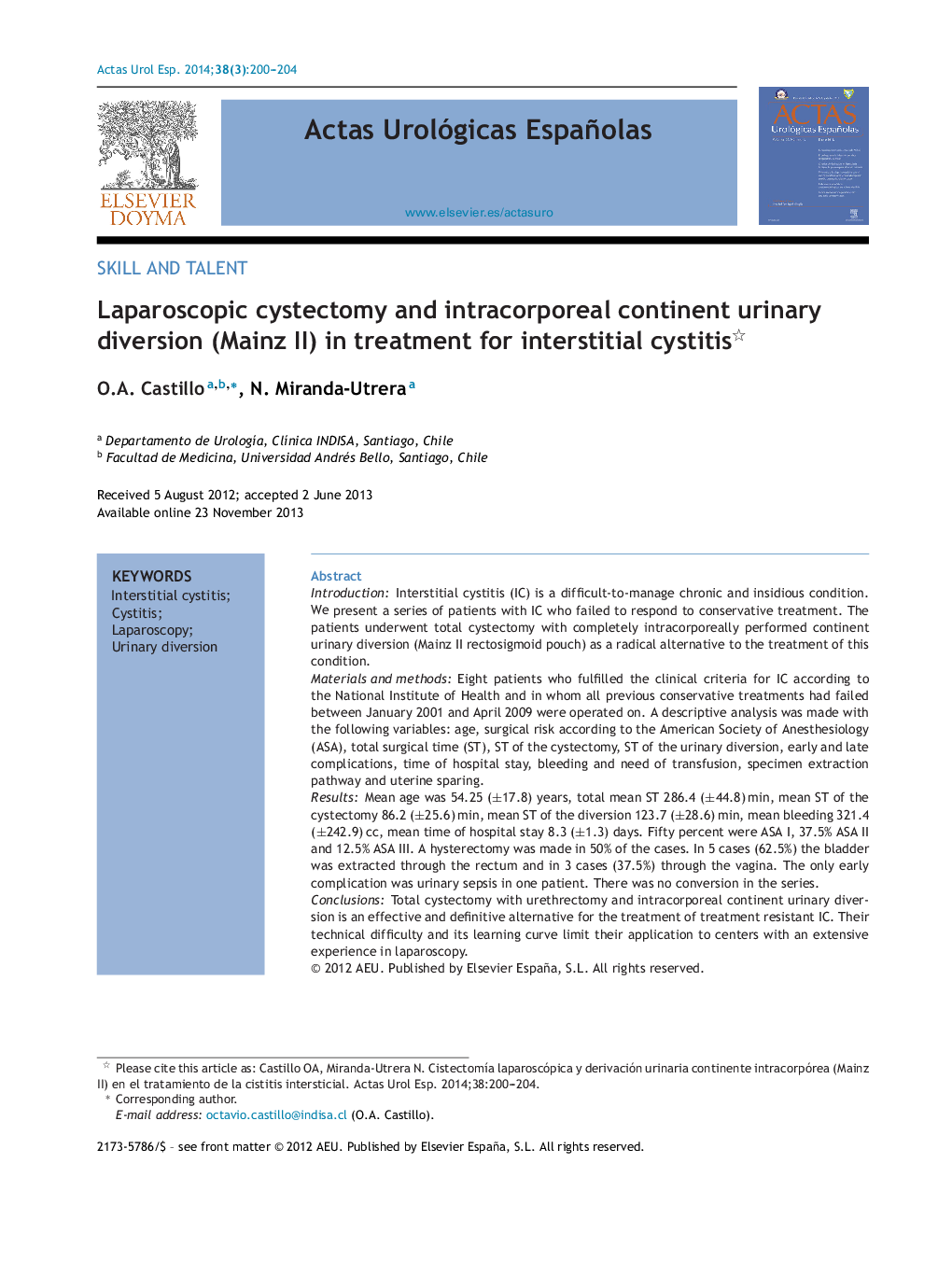| Article ID | Journal | Published Year | Pages | File Type |
|---|---|---|---|---|
| 3845641 | Actas Urológicas Españolas (English Edition) | 2014 | 5 Pages |
IntroductionInterstitial cystitis (IC) is a difficult-to-manage chronic and insidious condition. We present a series of patients with IC who failed to respond to conservative treatment. The patients underwent total cystectomy with completely intracorporeally performed continent urinary diversion (Mainz II rectosigmoid pouch) as a radical alternative to the treatment of this condition.Materials and methodsEight patients who fulfilled the clinical criteria for IC according to the National Institute of Health and in whom all previous conservative treatments had failed between January 2001 and April 2009 were operated on. A descriptive analysis was made with the following variables: age, surgical risk according to the American Society of Anesthesiology (ASA), total surgical time (ST), ST of the cystectomy, ST of the urinary diversion, early and late complications, time of hospital stay, bleeding and need of transfusion, specimen extraction pathway and uterine sparing.ResultsMean age was 54.25 (±17.8) years, total mean ST 286.4 (±44.8) min, mean ST of the cystectomy 86.2 (±25.6) min, mean ST of the diversion 123.7 (±28.6) min, mean bleeding 321.4 (±242.9) cc, mean time of hospital stay 8.3 (±1.3) days. Fifty percent were ASA I, 37.5% ASA II and 12.5% ASA III. A hysterectomy was made in 50% of the cases. In 5 cases (62.5%) the bladder was extracted through the rectum and in 3 cases (37.5%) through the vagina. The only early complication was urinary sepsis in one patient. There was no conversion in the series.ConclusionsTotal cystectomy with urethrectomy and intracorporeal continent urinary diversion is an effective and definitive alternative for the treatment of treatment resistant IC. Their technical difficulty and its learning curve limit their application to centers with an extensive experience in laparoscopy.
ResumenIntroducciónLa cistitis intersticial (CI) es una enfermedad de difícil manejo y de curso crónico e insidioso. Presentamos una serie de pacientes diagnosticadas de CI sin respuesta al tratamiento conservador, sometidas a cistectomía total con ureterectomía y derivación urinaria continente (Mainz II) laparoscópica totalmente intracorpórea, como alternativa radical al tratamiento de esta enfermedad.Material y métodosEntre enero de 2001 y abril de 2009 se operaron 8 pacientes que cumplían criterios clínicos y de exclusión para CI según el National Institute of Health y en las cuales había fracasado el tratamiento conservador. Se realizó un análisis descriptivo de la serie con las siguientes variables: edad, riesgo quirúrgico según la Sociedad Americana de Anestesiología (ASA), tiempo quirúrgico (TQ) total, TQ de la cistectomía, TQ de la derivación, complicaciones tempranas y tardías, tiempo de ingreso, sangrado y necesidad de transfusión, vía de extracción de la pieza y conservación del útero.ResultadosLa edad media fue 54,25 (± 17,8) años, el TQ medio total 286,4 min (± 44,8), el TQ medio de la cistectomía 86,2 min (± 25,6), el TQ medio de la derivación 123,7 min (± 28,6), el sangrado medio 321,4 cc (± 242,9) y el tiempo medio de ingreso 8,3 días (± 1,3). El 50% era un ASA I, el 37,5% ASA II y el 12,5% ASA III. En el 50% de los casos se realizó una histerectomía. En 5 casos (62,5%) se extrajo la pieza por el recto y en 3 casos (37,5%) por la vagina. La única complicación precoz fue una sepsis. No hubo conversión en la serie.ConclusionesLa cistectomía total con ureterectomía y derivación urinaria continente por vía laparoscópica e intracorpórea es una alternativa eficaz y definitiva para el tratamiento de la CI rebelde al tratamiento conservador. Su dificultad técnica y su curva de aprendizaje limitan su reproducibilidad a centros con importante experiencia laparoscópica.
